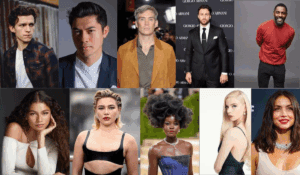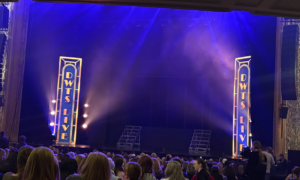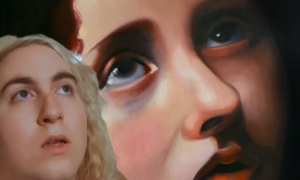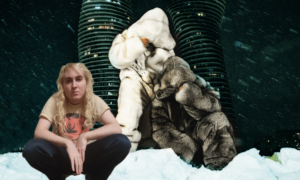For some, concerts might feel like a hassle. Whether it’s planning the event, rising ticket prices, or a distaste for crowds and long lines, are they really worth the effort? In an attempt to inform–and maybe even persuade–reluctant concert-goers, a group of performers and frequent attendees share their opinions on Seattle live music.
Kalum (pronounced kay-lum) Corbray, 23, has been rapping and recording music since his sophomore year of high school. He is an alum of The Residency, a youth program for hip-hop. Under his stage name KBred, Corbray has performed numerous shows, and most recently at the 2025 Folklife Festival, as part of a group from The Residency. His music is available on Instagram @kingkbred or on Spotify under KBred.
LaMaya Roundtree, 20, is another Residency alum. Performing as Maia, she advocates for self-love and positivity through hip-hop. Now a successful Seattle musician, Roundtree began writing, recording, and performing music in elementary school during regular school open mics. Her music draws from experiences of platonic, romantic, and universal love as core human emotions. Her Instagram handle is @maiagaiia via Linktree.
West Seattle-based singer and guitarist Riley Badgley, 18, frequently attends concerts and writes music. Performing under the stage name Rootbeer, he recently played a small show in Redmond, with more performances planned this summer.
Reflecting on their experience, Corbray, Roundtree, and Badgley spoke about the importance of both performing and attending live shows.
Regarding Seattle’s music scene, Corbray said, “We’re on like the cusp of an exponential curve.” He believes the scene could see a surge of new artists as soon as this summer.
When it comes to performing, Corbray tries to bring “positive vibes” to each show, he hopes that his attitude can help people “express themselves and not feel judged.”
For those unsure about concerts, Corbray says they should consider the type of show. As local musicians, Corbray, Roundtree, and Badgley all encourage going to local shows. But for those who have never been to a powerful arena show, it could be a new and worthwhile experience.
Corbray says that bigger shows bring a different energy. He cites Kendrick Lamar’s recent Climate Pledge performance as one example. At big shows, he said, people “tend to like dance more,” and the energy radiates across the crowd. A Beyoncé, Taylor Swift, or Kendrick Lamar concert is, for many, a powerful experience not easily replicated.
Still, crowds do not work for everyone. Arena shows, like those at Climate Pledge or Lumen Field, draw dense crowds and long lines. Ticket prices and other costs (parking, food, outfits) can run high. For some, this might feel like too much pressure.
Roundtree said, “Enjoying music doesn’t always have to be one way. So you’re totally, you know, as real of a fan if you go or not.”
Another option is to consider smaller shows. Badgley explains how attending smaller DIY shows encouraged him as a musician, saying it helped him realize “that people my age could do this.” After talking with performers post-show, he realized: “Well, if these guys can do music, like, what’s stopping me?”
Roundtree compares seeing music live as an “energy exchange.” For her, only seeing bigger artists can verge on a “parasocial relationship” with their image. As a performer herself, she says it can be a lot,“putting all that money and energy to like seeing someone else.” She adds, “I need the energy for my music and for the people who are supporting me. I think that’s totally valid.” When performing or attending local shows, that balance in energy feels more aligned.
Roundtree says she doesn’t buy into what she describes as the “fear of missing out,” common with major music festivals and world-famous artists’ concerts. This year, she decided against attending Miami’s Rolling Loud festival. Despite a stacked lineup including Future, Travis Scott, and Playboi Carti as headliners, she said she’s not going because “it requires a lot of energy to create and harness your own work,” and it felt like too much.
Despite their praise, smaller shows can take more effort to discover, especially house shows. These are held in makeshift venues and typically shared through word-of-mouth or on social media. They’re usually inexpensive, both for fans and bands. In the local scene, less experienced musicians often perform for the first time without label backing.
Corbray said it’s all about building local connections. Once someone finds “one house party out here in Seattle, and a few friends that know some people there, it’s always a really dope experience because people just go all-out at those.” It’s a different energy than a packed stadium, but like Badgley and Roundtree explained, it can be just as powerful.
For those unsure where to begin, Roundtree suggests: “Go to Instagram: go to the tags, and you can just type ‘Seattle live performance,’ look for hashtags, and you can find some relevant things.”
In the end, finding the right size and type of concert depends on the person. But before writing concerts off entirely, it’s worth exploring what the Seattle scene has to offer.
Roundtree said, “That’s the thing. You just got to try it. You just got to go out and try something. If you ‘hate’ concerts but always go with people, then go by yourself. That might be a fun experience. So, go by yourself, go with groups, go to small venues, large venues, free events!”
Author

Holly Brusse is a first-year student at Seattle Central College. Her interest in journalism started when she joined her high school newspaper during her sophomore year of high school. She enjoys writing on politics, music, and pop culture. Outside of school she enjoys listening to music, painting in watercolor, and spending time with her cat.







Be First to Comment